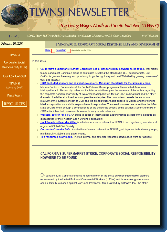 |
In this issue: - California's Supermarket Strike: Corporate Social Responsibility nowhere to be found. Wal-Mart's famous and most Darwinian brand of capitalism is setting the standard in U.S. supermarkets. But California grocers have a great opportunity to go the right way and beat Wal-Mart by gaining consumers' trust and loyalty.;
- CSR: Included aspects and relevant exclusions. Minimum standards for the Mexican ethos. Myriam Cardozo, Coordinator of the Public Policies Master program at Universidad Autonoma Metropolitana, in Mexico city, offers us this brief as a follow-up on the research of the author regarding the corporate social responsibility of two cement companies in Mexico, one multinational and the other domestic, the latter structured as a cooperative enterprise. The comparison reveals the enormous relativity of the current concept of CSR and the great latitude that is applied in Mexico and the world to label a corporation as socially responsible or irresponsible. The case illustrates one more time the infant state of CSR, often enough a consequence of the deliberate actions of the business sectors to make of CSR a discipline that conveniently serves its very private interests;
- Workers' tool or PR ploy? A guide to codes of international labour practice as part of the dialogue on globalization of the Friedrich Ebert Stiftung Foundation;
- Civil Society's Calendar 2004. A selection of events, relevant to TLWNSI, put together by members of organized Global Civil Society;
- Corporate Calendar 2004. A selection of events, relevant to TLWNSI, put together by business groups, multilateral institutions and governments;
- Top resources downloads. The top internal and external resources downloaded from our website.
CALIFORNIA'S SUPERMARKET STRIKE: CORPORATE SOCIAL RESPONSIBILITY NOWHERE TO BE FOUND
On January 12th, California entered its fourth month in the strike between supermarket workers represented by the United Fruit and Commercial Workers (UFCW) and three major grocery store chains. Initially launched against Vons and Pavilion's Stores owned by Safeway, Inc., the strike expanded the next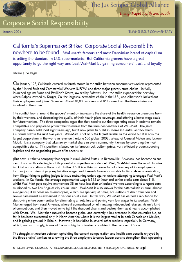 day when Ralphs, owned by Kroger, Co. the largest supermarket chain in the U.S., and Albertson's locked out their employees and joined Safeway. About 70,000 workers and 852 stores from the three chains are involved in the strike. day when Ralphs, owned by Kroger, Co. the largest supermarket chain in the U.S., and Albertson's locked out their employees and joined Safeway. About 70,000 workers and 852 stores from the three chains are involved in the strike.
The conflict looms around the grocers' intent on increasing the share of the health insurance premiums born by their workers, and decreasing the quality of their health plans coverage, and offering a lower wage scale for future workers. The three companies argue that they need to cut their operating costs in order to remain competitive and prepare to protect their business from the imminent entrance of Wal-Mart. The giant company barely sold food eight years ago, but it now plans to build 40 stores in Central and Southern California within the next two years. Wal-Mart is not only the largest retailer in the world but it is now the largest corporation in the world in revenue (Fortune 500 global, 2002), ahead of General Motors and Exxon- Mobil. It is a company that takes away market share in every community it enters by providing the most competitive stand. This position is based on its famous rock-bottom prices, very efficient product sourcing logistics and the negotiating power of its sheer size.
There is tremendous potential to tap on consumer support for good corporate citizenship. The three grocers in California and the UFCW are missing the opportunity. Nonetheless, they still have time to show the political will to think long-term and incorporate CSR into their strategic business model. It is a question of business savvy and political will to tap into the consumers' natural disposition to support the good guys and punish the greedy robber barons, if they are informed.
Nonetheless, if grocers choose Wal-Mart's Darwinian way, they will risk a consumer backlash to be sure, as organised civil society informs consumers of their greedy ways. The opportunity is for their taking. Read our full commentary here. TOP
CSR: INCLUDED ASPECTS AND RELEVANT EXCLUSIONS. MINIMUM STANDARDS FOR THE MEXICAN ETHOS
This work intends to follow-up on the ideas presented in this medium, in the months of June and July of last year, regarding the aspects included and excluded from the CSR concept. It is a result of research work developed in 2002 to analyze the CSR performance of two cement companies in Mexico, 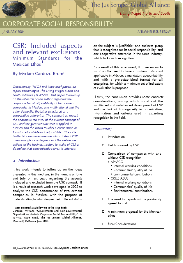 with the purpose of understanding to what degree their different status on the subject is justifiable: one business group that is recognized for its social responsibility, and one cooperative enterprise in the same industry, which lacks such recognition. with the purpose of understanding to what degree their different status on the subject is justifiable: one business group that is recognized for its social responsibility, and one cooperative enterprise in the same industry, which lacks such recognition.
As a result of this assessment, it is necessary to insist on the need to have a minimum standard applicable in México: a mandatory accountability and with a pre-established format for all enterprises, for which a minimum set of indicators of evaluation is proposed.
Lastly, the conclusion provides some concrete considerations, among which stand out the insufficient and unbalanced development of CSR and the lack of homogeneity in organization, information and criteria used in awarding recognition in the field.
Download The Jus Semper Global Alliance's new TLWNSI Issue brief on CSR.
Download the issue brief here.
TOP
WORKERS' TOOL OR PR PLOY? A GUIDE TO CODES OF INTERNATIONAL LABOUR PRACTICE AS PART OF THE DIALOGUE ON GLOBALIZATION OF THE FRIEDRICH EBERT STIFTUNG FOUNDATION
Ingeborg Wick prepared an analysis of the codes of conduct increasingly used by corporations and raised a series of important questions with interesting answers. Among the most relevant point raised by Wick: - Are these "new" codes just another form of public relations?
- Why should trade unions be concerned with these codes?
- Should trade unions be responsible for implementing codes of conduct?
- Who will decide whether systems of verification are credible?
- What about "social labelling"?
- What is the role for NGOs in codes of conduct?
- How are the new codes related to CSR?
- Where do the new codes fit into the trade union strategy for globalization?
Wick asserts that the fundamental role of governments is unrealistically diminished whilst the capacity of corporations to solve social and environmental problems is unrealistically exaggerated. Thus, the codes of conduct must not be allowed to become substitutes of governments and trade union and should be used to complement their work. Even more, corporations must not be allowed to define their own standards of conduct, for they must use legitimate and recognized standards,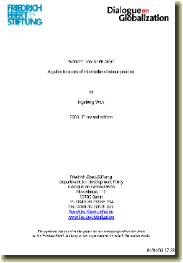 especially the ILO Tripartite Declaration of Principles for Multinationals and the OECD Guidelines for Multinationals. Furthermore, Wick considers that the responsibilities of companies with respect to human rights and working conditions go far beyond these principles and guidelines since they define only minimum standards. In this way, the codes of conduct must not become an alternative to national law or to industrial relations or to absolve governments from their responsibilities. especially the ILO Tripartite Declaration of Principles for Multinationals and the OECD Guidelines for Multinationals. Furthermore, Wick considers that the responsibilities of companies with respect to human rights and working conditions go far beyond these principles and guidelines since they define only minimum standards. In this way, the codes of conduct must not become an alternative to national law or to industrial relations or to absolve governments from their responsibilities.
A note of caution. The Jus Semper Global Alliance coincides in a very meaningful manner with this guide's perspective. Nonetheless, since Wick's analysis includes a presentation of some codes of conduct currently available -such as SA8000 and the Ethical Trading Initiative- the Alliance deems important to make a precautionary comment on this point. Wick considers that several of the codes of conduct in the analysis include the right to a living wage because they are based on some of the secondary ILO conventions and someway they mention wages. However, as we have always stressed in TLWNSI, the ILO only establishes a minimum wage criterion in its norms, which has not link whatsoever with the living wage concept. Therefore, the codes only define the living wage in an imprecise manner and fall into ambiguity. It is said that wages must cover the basic needs and be enough for the worker to save or have a discretionary income; but how to arrive to this income or what are the benchmarks or parameters to define the basic necessities or how much should the discretionary income be is never defined.
This is precisely the fundamental reason for the existence of TLWNSI and for defining the living wage as that providing the same material quality of life as that enjoyed by equivalent workers of the same corporation in the home country, as defined in terms of the purchasing power parities internationally recognized. In practice, living wages are systematically ignored by multinationals. In this way, Jus Semper asserts that none of the codes included -and none other to its knowledge- cover the fundamental element of the right to a living wage and, in the best case, they sometimes include a rather timid and ambiguous reference. Download the the full guide on codes of conduct on pdf TOP
RESOURCE CENTRE
This issue features the following resources:
- CIVIL SOCIETY'S 2004 CALENDAR
- World Social Forum, Mumbai (Bombay), India, 16 - 21 January, 2004. Read more
- Course: Budgets, accounting and analysis of Spanish non-profits' annual statements, Madrid, Spain, 27 - 29 January 2004. Read more
- The Trans-Atlantic Consumer Dialogue Annual, Consumers International, Brussels, Belgium, 1- 4 February 2004. Read more
- Winter Conference - United Students Against Sweatshops (USAS), Atlanta, U.S., 12 - 15 February 2004. Read more
- Why have a World Trade Organization? Focusing on the welfare effects of the law of the WTO, Adelaide, Australia, 25 February 2004. Read more
- Mediteranean Social Forum, Barcelona, Spain, March 2004 (days tbd). Read more
- EMAN Conference. Sustainability Accounting and Reporting, University of Lueneburg, Germany, 4 - 5 March 2004. Read more
- European Conference: The Social Rights of Europe, Brussels, Belgium, 18 & 19 March 2004. Read more
- International Sustainable Development Research Conference, University of Manchester, 29 - 30 March 2004. Read more
- National Student Labour Action Week, in all USAS affiliated campuses, U.S., 29 March to 4 April 2004. Read more
- CERES Conference 2004: Critical Decisions for Long-lasting prosperity, Boston, U.S., 14 - 15 April 2004. Read more
- Impact Assessment and Capacity Building , Vancouver, Canada, 26 - 29 April, 2004. Read more
- ILO's 92nd International Labour Conference, Geneva Switzerland, June, 2004. Read more
- Corporate Social Responsibility and Environmental Management Conference, University of Nottingham, UK, 28 - 29 June, 2004. Read more
- Economists without Borders Summer Course: Management of Corporate Social Responsibility, the Banks Case, National University of Distant Education UNED, Madrid, Spain 7 - 11 July 2004. Read more
- Social Forum Américas, Quito, Ecuador, 25 - 30 July 2004. Read more
- European Environment Conference, September 2004 (place and dates to be confirmed). Read more
- European Social Forum 2004, London, UK, November 2004 (dates tbd). Read more
TOP
- CORPORATE 2004 CALENDAR
- World Economic Forum Annual Meeting, Davos, Switzerland, 20 - 25 January, 2004. Read more
- Reshaping Corporations: Adding Value Through Responsible Business Practices, Boston, U,S, 25-27 January. Read more
- OECD, BASF, Loccum Academy, Embassy of Brazil: Global Responsibility of Companies: Foreign Direct Investment as an Engine of Sustainable Development? Berlin, Germany, 28 January 2004. Read more
- Sustainable Development Summit, New Delhi, India, 4-7 February 2004. Read more
- Sustainable Development at the WTO - Trade, Investment and the Environment afer Cancun, London, UK, 23 - 24 February 2004. Read more
- World Business Academy Annual Conference, Global Mindchange Forum, The Transformative Role of Business in a Chaotic World , Santa Barbara, U.S., 12 - 14 March 2004. Read more
- Seventh Annual Summit of Sustainable Enterprise, World Resource Institute, Washington, U.S., 17 & 18 March 2004. Read more
- Centre for Corporate Citizenship at Boston College: International Annual Conference, San Francisco, U.S., 28 - 30 March 2004. Read more
- Inter-American Development Bank Annual Meeting, Lima, Peru, 29 - 31 March 2004. Read more
- Ethical Corporation Conference, Operanting in China and Corporate Responsibility, London, UK, 30-31 March 2004. Read more
- 1st Middle East Summit of Corporate Social Responsibility, Dubai, Dubai, UAE, 25-27 April 2004. Read more
- European Economic Summit 2004 of the WEM, Warsaw, Poland 28 - 30 April 2004. Read more
- Ethical Corporation Europe Conference 2004, Management of Corporate Social Responsibility, London, UK, 11-13 May 2004. Read more
- Centre for Corporate Citizenship at Boston College, Transparency course, Stakeholder Engagement and Social Reporting, Toronto, Canada, 20 - 21 May 2004. Read more
- African Economic Summit 2004 of the WEM, Maputo, Mozambique, 2 - 4 June 2004. Read more
- Poverty Reduction Strategies. What progress has been made?, Wylton Park Conferences, UK, 11 - 14 June 2004. Read more
- Eleventh Session UNCTAD, Sao Paulo, Brazil, 13-18 June 2004. Read more
- Ethos Institute, National Conference 2004, Sao Paulo, Brazil, 30 Jun e - 2 July. Read more
- International Association for the Economics of Participation (IAFEP) 2004 12th Biannual Conference: Mending the Global Economy: A Role for Economic Participation, Halifax, Canada, 8 - 10 July, 2004. Read more
- The International Society of Business, Economics and Ethics (ISBEE). The Third ISBEE World Conference: Freedoms and Responsibilities in Business, University of Melbourne, Australia, 14 - 17 July, 2004. Read more
- Taking Forward the World Trade Negotiations, Wylton Park Conferences, UK, 19 - 22 July 2004. Read more
- 2004 Annual Meeting of the International Monetary Fund and the World Bank Group, Washington, U.S., 4 - 5 October 2004. Read more
- BSR Annual Conference 2004 (Business Social Responsibility), New York, EU.S., 9 - 12 November 2004. Read more
TOP
TOP RESOURCE DOWNLOADS Following are the top ten internal and external information resources downloaded from our website in the previous quarter. Below the chart are the links for each resource if you want to download them
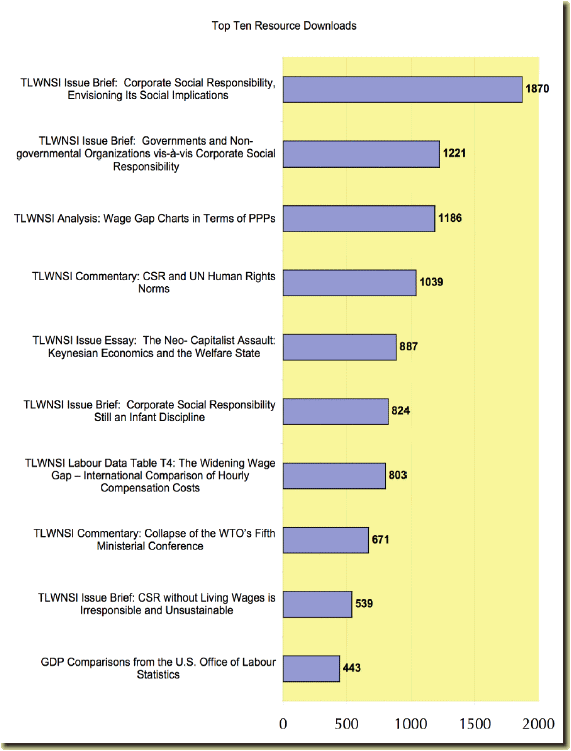
To download click below:
1.TLWNSI Issue Brief: Corporate Social Responsibility, Envisioning Its Social Implications
2.TLWNSI Issue Brief: Governments and Non-governmental Organizations vis-à-vis Corporate Social Responsibility
3.TLWNSI Analysis: Wage Gap Charts in Terms of PPPs
4.TLWNSI Commentary: CSR and UN Human Rights Norms
5.TLWNSI Issue Essay: The Neo- Capitalist Assault: Keynesian Economics and the Welfare State
6.TLWNSI Issue Brief: CSR Still an Infant Discipline
7.TLWNSI Analysis: Labour Data Table T4: The Widening Wage Gap - International Comparison of Hourly Compensation Costs
8.TLWNSI Commentary: Collapse of the WTO's Fifth Ministerial Conference
9.TLWNSI Issue Brief: CSR Without Living Wages is Irresponsible and Unsustainable
10. Comparative Real Gross Domestic Product Per Capita and Per Employed Person, Fourteen Countries, 1960-2003. Prepared by: U.S. Department of Labor Bureau of Labor Statistics
Thank you so much for your support. If you have any questions or comments, Please e-mail us: gsc@jussemper.org
If you are not a member of our eCommunity yet, please click here to sign up for TJSGA's eCommunity to receive our quarterly newsletter. If you do not wish to continue receiving our quarterly newsletter, just e-mail us writing in the subject "unsubscribe" nosuscrip@jussemper.org.
TOP |  |











